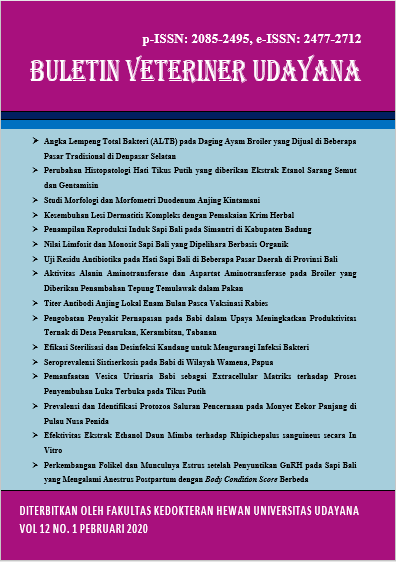PREVALENCE AND IDENTIFICATION OF GASTROINTESTINAL PROTOZOA IN LONG-TAIL MONKEY IN NUSA PENIDA ISLAND
Abstract
This study aims to determine the type and prevalence of protozoa that infects the digestive tract in long-tailed monkeys on the island of Nusa Penida. This study was an observational study, using 50 faces samples taken from 10-15 stools at random locations. Stool was examined using a concentration of flotation method with Zinc Sulphate (ZnSO4) 33.1%. Examination with a 40x microscope objective magnification to look at the morphology. The data obtained are presented descriptively including the type and prevalence of gastrointestinal protozoa in long-tailed monkeys. The study found that there were 40% of gastrointestinal protozoan infections in long-tailed monkeys on Nusa Penida Island. The type of infecting protozoa consists of Entamoeba sp. by 40% and Balantidium coli by 32%. Efforts should be made to prevent the spread of protozoa, through hygiene and sanitation education to the community.
Downloads
References
Burgos-Rodriguez A. 2011. Zoonotic disease of primate. Vet. Clin. Exot. Anim. 14: 557-575.
Gupta S, Bharati P, Sinha KP, Shrivasta RK. 2017. Balantidium coli: Rare urinary pathogen or fecal contaminant in urin? Case study adn review. J. Dental Med. Sci. 16(3): 88-90.
Hadi I, Suryobroto B, Perwitasari FD. 2007. Food preference of semiprovisioned macaques based on feeding duration and foraging party size. Hayati J. Biosciences. 14(1): 13-17.
Joesoef JA, Sajuthi D, Wijaya A, Saban MUE. 2018. Keragaman endoparasit pada macaca fascicularis dan potensi zoonotiknya dengan cuaca berbeda di Kota Kupang. J. Vet. 19(4): 451-459.
Levecke B, Dorny P, Geurden T, Vercammen F, Vercruysse J. 2007. Gastrointestinal protozoa in non-human primates of four zoological gardens in Belgium. Vet. Parasitol. 148: 236–246.
Levine ND. 1990. Buku Pelajaran Parasitologi Veteriner. Gadjah Mada University Press. Yogyakarta.
Mahayuni NPK, Watiniasih NL, Yusup DS. 2018. Populasi dan perilaku kera ekor panjang (Macaca fascicularis) di Desa Pancasari Sukasada Buleleng Bali. J. Simbiosis. 6(1): 12-15.
Maryatun. 2008. Entamoeba histolytica: Parasit penyebab amebiasis usus dan hepar. J. Kedokteran Syiah Kuala. 8(1): 39-46.
Nugraha EY, Wandia IN, Soma IG. 2018. Variasi genetik populasi monyet ekor panjang (Macaca fascicularis) di Pulau Nusa Penida, Klungkung, Bali. J. Vet. 19(4): 531-538.
Rahmi E, Hanafiah M, Sutriana A, Hambal M., Wajidi F. 2010. Insidensi Nematoda Gastrointestinal dan Protozoa pada Monyet Ekor Panjang (Macaca fascicularis) Liar di Taman Wisata Alam (TWA) Pulau Weh Sabang. J. Ilmiah Ilmu-Ilmu Peternakan.13(6): 286-291.
Ridho H. 2011. Prevalensi Protozoa Saluran Pencernaan pada Monyet Ekor Panjang (Macaca Fascicularis) Melalui Pemeriksaan Feses di Kebun Binatang Surabaya. Skripsi Sarjana Kedokteran Hewan, Universitas Airlangga
Rivera WL, Anthony J, Yason DL, Edric D, Adai V. 2009. Entamoeba histolytica and Entamoeba dispar infection in Captive Macaques (Macaca fascicularis) in the Philippines. Japan Monkey Centre and Springer.
Supriatna J, Wahyono EH, 2000. Panduan lapangan: Primata Indonesia. Jakarta: Yayasan Obor Indonesia.
Toft JD, Eberhard ML. 2012. Nonhuman primates in biomedical research diseases 2nd Ed. Bennet BT, Abee CR, Tardif S, Morris T, editor. Kanada (US): Academic Press.
Yulfi H. 2006. Protozoa intestinalis. Skripsi. Universitas Sumatera Utara. Repository. Medan.





